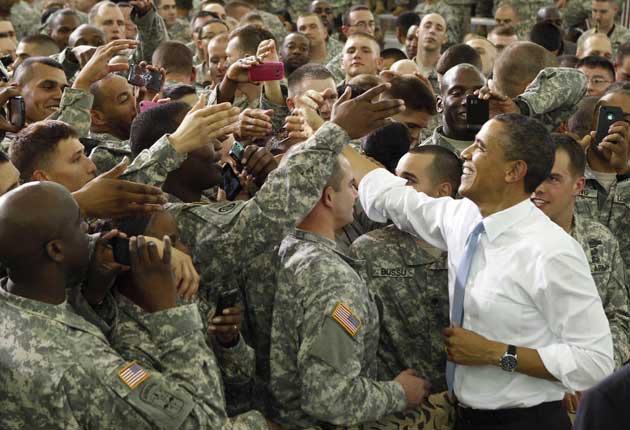Obama's words often ring hollow. Will it be the same with Afghanistan?

Alhamdulillah! President Barack Obama is finally withdrawing troops from Afghanistan. Except he's not – only those extras that he deployed in the "surge" of 2009; 68,000 will remain, double the number sent by his predecessor, George Bush.
Obama keeps doing this. Sounding marvellous, then, in retrospect, disappointing.
After eight long and bloody years of Bush, everyone outside America, especially Muslims, welcomed this voice of reason, sobriety and perhaps even empathy.
Scribbled on a bullet-punctured wall in Gaza was "Obama Inshallah!". Even in Pakistan, the only ally of the US, which the US regularly bombs, people came out on the streets – any excuse, admittedly – to celebrate his election victory.
There was not a burning effigy in sight because here was an American president who had a Muslim middle name, a Muslim father and a daughter called Malia, named after, no, not a Hawaiian family friend but, as everyone now knows, the daughter of the Caliph Othman. Obviously.
Even if he wasn't actually a secret Muslim, despite all the wishful whispering over chai that rivalled any Tea Party tittle tattle, at least he understood Muslim culture, having grown up (OK, spent some of his childhood) in Indonesia regularly attending Friday prayers at the mosque (or maybe just once) with his devout (non-observant) Muslim stepfather.
During his election campaign, he promised to "end the war in Iraq" and "finish the job against al-Qa'ida". No one thought "how's he going to do that?" because all everyone had been waiting to hear were the words "end" and "finish".
For a short spell, al-Qa'ida's recruiting agents must have been scratching their beards. But before they had time to say "war on Islam", the anti-war, Islamophile President Obama had tripled the size of the American force in Afghanistan, approved military action in four other Muslim countries – Pakistan, Somalia, Yemen and more recently Libya – and drastically increased the use of predator drones.
Within 72 hours of settling into the Oval Office, before Pakistanis had even had time to remove the bunting, wash off the henna and restarch their kurtas, the Nobel Prize-winning president had "droned" (it's become a verb) Pakistan's tribal areas.
It didn't take long for Pakistanis to realise and for local newspapers to report with colourful snaps of collateral damage that while dastardly Bush – the real baddie, surely – had used unmanned predator drones 45 times in his eight years in office, Obama was not going to be outdone. He unleashed 118 drones on Pakistan last year alone. According to a Brookings Institute report, charmingly entitled "Do targeted killings work?", for every one militant killed by these strikes, 10 or so civilians have died.
According to US commanders' official figures, 14 al-Qa'ida leaders have been killed in the tribal areas and 700 civilians.
Officials were quick to point out that, of those 700 innocents, "only" 25 per cent were a direct result of Nato bombs. Phew.
There's a Middle Eastern proverb: "It's me and my brother against my cousin. But it's me and my cousin against a foreigner." Now half a million Pakistani tribals are up in arms, namely Kalashnikovs, which every man in the region owns.
A poll revealed last week that 69 per cent of Pakistanis now view the US as more enemy than ally, and only 8 per cent have confidence in Barack Obama – they've dropped the Hussein – to do the right thing in world affairs.
Nuclear-armed Pakistan, with its discredited and fractured military and its own Taliban, has been badly destabilised by the "war on terror".
Before 2002, there was no Pakistani Taliban and suicide attacks were unheard of. Last year, in Pakistan, 11,585 people were killed as a result of terrorist incidents, including 80 suicide attacks.
There comes a point when you have to ask: what is more dangerous, terrorism or counter-terrorism? The irony of the "war on terror" is that the US can win it only when it finally stops fighting it. Undeterred, the US defence department has asked for a 75 per cent increase in funds to further enhance drone operations in Pakistan.
The US already spends more on war – sorry, defence – than all the other countries in the list of the world's top 10 military spenders combined. "We will not relent until the job is done," said Obama on Wednesday, when announcing the partial troop withdrawal from Afghanistan. What is a job done? What defines victory?
Obama took the opportunity to clarify the war objectives: "To defeat al-Qa'ida," and eliminate safe havens, though more safe havens exist and terrorists operate now outside Afghanistan, from Peshawar to Sanaa. It's about fighting the resurgent Taliban, he said, who, after a decade of fighting, are now in control of two-thirds of the country, poised to fill any vacuum and in political talks with Obama's own people. It's about leaving a functioning Afghan state that can defend itself, though Hamid Karzai's government is the second-most corrupt government in the world (according to Transparency International's corruption index) and is in power only thanks to American protection.
By 2015, he will probably be househunting in Marble Arch, for a pad near his old neighbour, President Musharraf.
The war will be concluded on the very terms it could have been concluded 10 long, bloody years ago, trillions of dollars ago, thousands of lives ago. Will someone then refute the oft-repeated mantra of our leaders: "They did not die in vain"?
i@independent.co.uk
Christina Patterson is away
Join our commenting forum
Join thought-provoking conversations, follow other Independent readers and see their replies
Comments
Bookmark popover
Removed from bookmarks